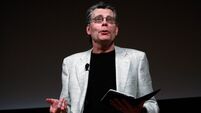Better to prevent than prepare for a collapse

Sisyphus, the king condemned to push a boulder up a mountain for eternity. Is it possible he found meaning in the struggle itself? Illustration by Conor McGuire
Something curious is happening in the prosperous suburbs of Ireland. Sales of camping equipment have surged among individuals who have no interest in traditional camping. Water purification systems appear in gardens that already enjoy a perfectly adequate municipal supply. Allotments in Dublin command waiting lists longer than those for rugby season tickets. The new survivalism has arrived, and it speaks with a professional-class accent.
This is the new Irish survivalism: middle-class catastrophism with proper planning permission. No guns – this being Ireland, where acquiring a shotgun requires more paperwork than a mortgage – but plenty of ingenious alternatives. Root cellars disguised as wine storage. Rainwater collection systems that happen to double as insurance against societal collapse.
It's survivalism for people who read the Financial Times and worry about their carbon footprint. They're preparing for the apocalypse while maintaining their pension contributions and scheduling their annual health checks. It's as if they've decided that civilisation might end, but there's no reason to be unprofessional about it.
The curious thing is that these are precisely the people who, by any historical measure, have won life's lottery. They live longer, healthier, more comfortable lives than any previous generation. Yet they're haunted by intimations of decline that would have puzzled their grandparents, who actually lived through rationing and butter vouchers.
We've entered what historians may one day call the Age of Prosperous Pessimism. Never before has a generation enjoyed such material abundance while maintaining such firm convictions about impending doom. It's like having a magnificent feast while insisting the food is poisoned.
The source of this malaise isn't mysterious. We've created societies so complex, so interconnected, so dependent on invisible networks of trust and cooperation, that their very sophistication makes them feel fragile. A computer glitch grounds every flight in Europe. A blocked canal paralyses global trade. A laboratory leak shuts down the world. We've built a magnificent clockwork of interdependence, and we're acutely aware that all clocks eventually break.
But there's something else at work here: the Entropy Fallacy. People have discovered the Second Law of Thermodynamics – that energy flows from hot to cold, that systems tend toward disorder – and have somehow concluded that human affairs must follow the same inexorable path. Ice cubes melt in gin therefore civilisations must collapse. It's the kind of logical leap that would have impressed medieval scholastics.
The fallacy lies in confusing scales. Yes, the universe is slowly winding down toward heat death, but that won't happen for trillions of years. In the meantime, local pockets of order can emerge and persist. Crystals form. Rivers carve canyons. Life appears. Your refrigerator makes ice even as your drink grows warm. The Middle East might be in terminal conflagration but the leafy suburbs of Ballina are just fine. Entropy increases globally while decreasing locally.
Civilisations don't collapse because of thermodynamics, they collapse because people stop doing the work necessary to maintain them. The Roman Empire didn't fall due to entropy, it fell because the Romans stopped behaving like Romans. They lost faith in their institutions, their values, and their capacity for collective action. Sound familiar?
This is where our current predicament becomes genuinely interesting. We are facing multiple threats – World War III at the gates, earthquakes and volcanoes erupting, the threat of disease or nuclear annihilation. But we're also facing something more subtle and perhaps more paralysing: a collective loss of nerve. We've become a civilisation of Hamlets, immobilised by our own self-consciousness, unable to act decisively because we can see too many angles, anticipate too many consequences, imagine too many ways things might go wrong.
The medieval monks called it the “midday demon” – that peculiar listlessness that strikes when the sun is highest and energy should be greatest. It's not quite depression, more a bone-deep weariness that whispers persuasively in your ear: why bother? Every effort feels predetermined to fail, every small victory destined to be reversed, every good intention bound to meet some immovable force of bureaucracy, corruption, or simple human stupidity. The game feels rigged because, in many ways, it is.
Acedia is the occupational hazard of intelligence. The more you know about the world's complexity, the more daunting it becomes to imagine changing it. The more you understand about unintended consequences, the more reluctant you become to intend anything at all. This is why the most educated populations often seem the most paralysed, why universities – supposedly centres of enlightenment – have become hotbeds of despair.
Here's the maddening contradiction: never before have humans possessed such vast knowledge, such abundant resources, such sophisticated tools for tackling the world's problems. Yet we've never felt more impotent in the face of them. It's rather like being an accomplished chef who's read so many studies about salmonella and botulism that he's afraid to turn on the stove. The more we know about what can go wrong, the less inclined we are to try anything at all.
The solution, if there is one, might lie in an unexpected source: Albert Camus and his interpretation of Sisyphus, the king condemned to push a boulder up a mountain for eternity, only to watch it roll back down each time he nears the summit. Camus argued that we must imagine Sisyphus happy, not because he'll eventually succeed, but because he's found meaning in the struggle itself.
This strikes me as the essential insight for our times. We cannot escape the absurdity of pushing boulders up mountains that will never be conquered. We could be atomised in seconds, build institutions that will decay, create art that will be forgotten. But we can choose to find dignity in the struggle, joy in the very futility of our endeavours.
The genius of Camus’ interpretation lies in his ability to locate freedom in the acceptance of constraint. Sisyphus cannot escape his fate, but he can choose his attitude toward it. He can push his rock with resignation or with defiance, in despair or with something approaching joy. The gods have condemned him to meaningless labour, but they cannot control how he bears that condemnation.
What separates the optimist from the pessimist isn't different assessments of probability but different responses to uncertainty. The pessimist sees the boulder rolling back and concludes the task is pointless. The optimist sees the same thing and decides to enjoy the walk back down the mountain.
This doesn't mean abandoning prudence or ignoring genuine risks. Climate change may be real, peace is fragile, and democracy requires constant maintenance. But the proper response to uncertainty isn't retreat into bunkers – literal or metaphorical – but deeper engagement with the world as it is.
The bunker mentality represents a category error: preparing for collapse rather than working to prevent it. The real preparation isn't stockpiling supplies but maintaining the habits of civilisation – reading books, having conversations, making music, fighting injustice, raising children who might do better than we have.
After all, every generation believes it's witnessing the end of the world, and every generation is both right and wrong. Things end constantly – empires fall, institutions crumble, certainties dissolve – but life stubbornly continues, often in forms we couldn't have imagined. The Victorians were convinced that horse manure would bury London; instead, they invented the automobile. The Cold War generation prepared for nuclear winter; instead, they got the internet and global warming.
Sisyphus may teach us something different: that hope isn't the opposite of futility but its natural companion. The rock tumbles down regardless of our mood about it. What matters is whether we trudge back down, cursing the gods or whistling a tune, whether we treat each fresh ascent as cosmic punishment or an excuse to stretch our legs and enjoy the view.
Now I'm off to impose some order on my rural idyll, cutting unruly grass and dead heading the petunias. With such stubborn constancy, blossoming mushroom clouds and the trumpets of war become entirely irrelevant.





